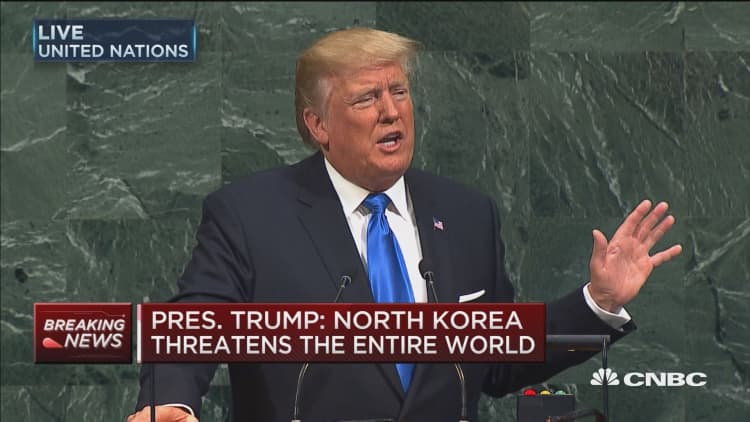President Donald Trump won't say yet whether he is going to "decertify" the Iran nuclear deal — but his decision could impact America's international standing as much as Iran's.
Trump told reporters on Wednesday that he has already made up his mind on the international agreement next month, though he did not reveal what the decision is. He has taken a much harder line toward Iran than his predecessor President Barack Obama.
Under a law passed by Congress, the president must certify every 90 days whether Iran remains in compliance with the landmark, 2015 pact, which lifted severe economic sanctions on Iran in exchange for the country freezing its nuclear activities. NBC reported Wednesday that Trump is leaning toward decertifying the agreement.
A U.S. decertification would not necessarily end the deal — the U.S. just wouldn't be part of it anymore. The Europeans won't return to sanctions so quickly. If this enables Airbus to beat out Boeing, they'd be delighted.Robert Litwakinternational security expert, the Wilson Center
If the president does decide to decertify the deal and possibly reimpose sanctions, "we'd be in uncharted waters," says Robert Litwak, a member of the National Security Council under President Bill Clinton, now an expert on international security at the Wilson Center. "The U.S. would risk isolation, not Iran."
Litwak said he believes there's a logical argument to be made that Iran isn't cooperating with the spirit of the deal — by testing missiles, funding and arming terrorist groups including Hezbollah and fueling civil wars in Yemen and Syria.
But those issues aren't actually included in the 2015 agreement known as the Joint Comprehensive Plan of Action, which was signed by Iran, the United States, France, China, Russia, the United Kingdom, Germany and the European Union. Proponents of the agreement argue it's the best way to keep Iran from becoming a nuclear-armed nation, at least until the sunset provision on the deal expires in eight years.

If the U.S. decertifies the deal, "the ball immediately goes to Iran's court," said Michael O'Hanlon, a foreign policy expert at the Brookings Institution. Iran "could have their cake and eat it too."
It would be possible, O'Hanlon explained, for Iran to keep the benefits it gets from the agreement — namely, to continue to legally export oil. Then, a few years down the road it could argue that the agreement is null due to a lack of compliance from the United States. It could then resume nuclear activities.
That's not an attractive prospect for U.S. decision-makers, because it would force them to make a choice: either attack Iran's nuclear facilities, or push for new sanctions from a group of countries that will almost certainly be reluctant to give up business ties with Iran.
Is Trump Bluffing?
"It would be totally irresponsible to decertify," according to Gary Sick, a professor at Columbia University who served on the National Security Council under Presidents Reagan, Ford and Carter. Sick added that "decertification is actually contrary to U.S. interests by all standards."
Sick says it's unclear whether Trump will make the move or if he's just trying to make it clear "that he doesn't like the deal negotiated under President Obama."
If President Trump separates from the agreement, the deal may simply live on without the United States.
"A U.S. decertification would not necessarily end the deal — the U.S. just wouldn't be part of it anymore," said Litwak. "The Europeans won't return to sanctions so quickly. If this enables Airbus to beat out Boeing, they'd be delighted."
Iran has increased trade with Asian and European countries since the agreement was signed, but not with the United States. However, the U.S. could impose new sanctions that make it risky or impossible for companies to do business with Iran, by declaring that they can't do business in both Iran and the United States.
"Iran knows perfectly well it's a middle level power with a middle level economy and if companies and countries have to choose, it would be hard to go against the U.S.," said Sick at Columbia University.
'Wedge issue'
European leaders have made it clear they want the agreement with Iran to stay in place, because they believe it's working.
"This could become a real wedge issue dividing the other powers in the agreement ... against the U.S.," Sick said. "It could push the U.S. toward a decline in global power and U.S. credibility will take a huge hit, because we're basically telling the world the U.S. can't keep its word, putting us at odds with every other major power in the world, hurting our credibility, influence and reliability as an international partner — that's not a small issue."
Decertification could also hurt the United States when it's negotiating with other countries on entirely separately issues.
"Imagine trying to negotiate with North Korea when we just walked away from the most significant non-proliferation treaty in the history of the atomic age," Sick said.
O'Hanlon warned that the Trump administration is on a path that will force it to make "real decisions on Iran and North Korea that could make everything else this administration has decided on inconsequential."


